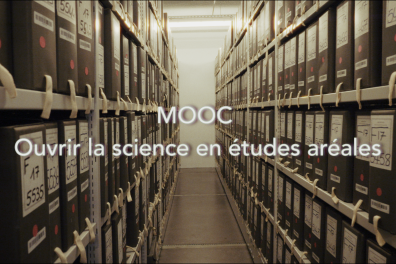Launch of the disciplinary MOOC "Ouvrir la science en études aréales" (Opening up science in areal studies): registration until November 18!

Tools, methods and digital challenges of a shared science with and for society
This MOOC offers you a deep dive into the practices of open science, applied to the humanities and social sciences, with a specific focus on areal studies. Built around three main axes - open science, digital humanities, science with and for society (SAPS) - it will give you the keys to understanding, transforming and sharing your research approach.
Through videos, quizzes, reflective activities and concrete case studies, you'll discover how to manage, publish, document and disseminate your data in compliance with the FAIR principles, while taking into account the specificities of your fields, languages, corpora or audiences.
This MOOC is aimed as much at researchers and PhD students as at IST professionals, engineers, librarians, archivists and, more broadly, anyone wishing to contribute to more open, ethical and collaborative research.
Presentation of the MOOC - Teaser
The pedagogical team presents the MOOC "Ouvrir la science en études aréales" :
- Assen Slim, Professor of International Economics, economist, teacher-researcher, university professor at Inalco
- Sarah Cadorel, Head of the Scientific Information, Archives and Heritage Department Open Science Referent
- Mathilda Lacroix, Head of the Events and Cultural Action Department
- Bastien Sepúlveda, Digital Humanities Officer
Training schedule
- September 1, 2025: registration on the platform France Université Numérique (FUN)
- October 6, 2025 : opening of MOOC content
- December 20, 2025: end of course
What you'll learn
By the end of this course, you'll know:
- Explain the scientific, political and ethical issues of open science.
- Apply FAIR principles to your own research productions.
- Identify good practices for publishing, archiving, disseminating or preserving your results.
- Know the existing resources and devices for engaging in a "science-society" approach.
- Choose tools and platforms adapted to your disciplines and data.
Format
The course is structured into 4 modules, each structured around thematic sequences and videos illustrated by concrete cases from areal studies. Weekly working time is estimated at between 2 and 5 hours.
The resources are varied: videos, quizzes, texts, interactive content, downloadable resources, discussion forums...
Evaluation and certification
This MOOC is not certifying, but thanks to your participation each week in the quizzes you can check your knowledge and validate your achievements to obtain a digital badge at the end of the course. In order to obtain the digital badge, you will need to validate at least 60% of it.